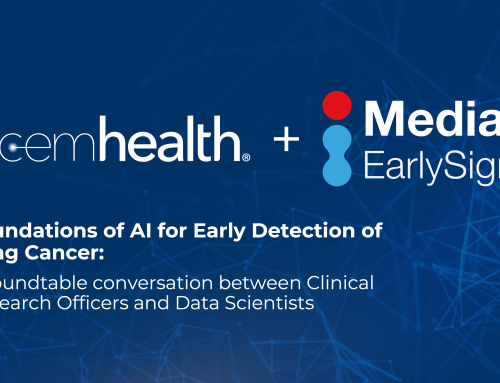
Early Detection of Colorectal Cancer Using AI
Did you know that colorectal cancer (CRC) is the fourth most commonly occurring cancer in the United States?
And approximately 32% of age-eligible U.S. adults are overdue for colorectal cancer (CRC) screening, creating a significant need for identifying those at higher risk for possible lower GI issues. Thanks to the advancements in artificial intelligence (AI) and machine learning (ML), early detection is now possible, potentially saving thousands of lives annually.
AI: A Major Advance in Colorectal Cancer Detection
AI is revolutionizing healthcare, including in cancer detection. By combining the power of advanced algorithms and the expertise of clinicians, AI solutions help medical professionals to detect CRC risks earlier. This advancement results in more targeted treatments and improved outcomes.
Analyzing Medical Data Using AI Algorithms
In the fight against CRC, AI algorithms play a critical role. Some are designed to analyze large volumes of medical images, such as colonoscopy and endoscopy data. By pinpointing abnormalities and tumors with high accuracy, AI can significantly enhance the detection process. Other AI solutions focused on early detection of colorectal cancer risks use untapped medical data that already exists on patient records in EHRs.
Cutting-Edge Machine Learning Models
Advanced machine learning models are at the heart of these AI solutions. They learn from vast datasets and become more effective in detecting colorectal cancer. For example, one provider organization using a model developed by Lucem Health partner, Medial EarlySign, saw that 70% of patients flagged with the highest risk for CRC had significant findings during their screening.
AI’s Role in Reducing False Positives and Negatives
One of the major challenges in early cancer detection is avoiding false positives and negatives. AI can reduce these errors by providing better insights and understanding of medical data. This leads to more precise diagnoses and timely life-saving interventions.
Personalized Risk Stratification for Improved CRC Screening
Current practice encourages eligible adults to obtain a colorectal cancer (CRC) screening but lacks a sophisticated method for risk-stratifying patients. As a result, the patients who present for screenings are those who best adhere to clinical guidelines, rather than necessarily being those patients who are most at risk for lower GI disorders. By leveraging validated AI, data-driven algorithms, and predictive modeling, healthcare systems can create more targeted and efficient CRC screening programs, focusing additional attention on patients who appear to be at higher risk for lower GI disorders so they receive screening and intervention in a timely manner.
Optimizing Resource Utilization and Efficiency
Untargeted CRC screening limits a provider organization’s ability to maximize the clinical and financial yield from its most valuable resources: clinicians, exam rooms, procedure suites, and hospital beds. By implementing a more targeted risk-assessment approach, healthcare providers can optimize the use of their resources, prioritizing patients with greater apparent risk. This provides another tool for healthcare organizations to reduce costs, improve workflow efficiency, and enhance patient care and outcomes, driving better overall performance and long-term sustainability.
Overcoming the Challenges of AI in Fighting Colorectal Cancer
While AI has displayed immense potential in CRC detection, there are still some hurdles to overcome. The key to unlocking the full potential of AI lies in addressing these challenges and looking for ways to improve.
Complex systems integration is one of the primary challenges in leveraging AI for colorectal cancer detections and treatment.
The healthcare industry relies on numerous systems, databases, medical devices, and platforms to store, share, and analyze critical patient data. Integrating AI into these complex ecosystems requires deep understanding and effective communication between data scientists, software engineers, medical professionals, and other stakeholders. Additionally, many systems utilize proprietary formats and protocols, which makes interoperability more challenging. Ensuring seamless integration, data privacy, and security, while also maintaining the integrity of patient information is essential for the success of AI implementation in colorectal cancer care.
Difficulty changing clinical workflows poses another challenge in incorporating AI into the battle against colorectal cancer.
Medical professionals and healthcare institutions have established procedures and practices that have been honed over the years. Integrating AI into these workflows often necessitates modifications to established procedures, staff retraining, and a change in the mindset of practitioners to trust and adopt AI-driven recommendations. Often when implementing new healthcare technologies, clinical workflows must be restructured, and institutions may face internal resistance to change. Successful AI implementation, however, does not necessarily require clinician workflow changes, especially when the AI solutions work in the background to help prioritize patient identification.
The cost of implementing AI in colorectal cancer care is a significant barrier, particularly given the financial constraints faced by many healthcare systems.
The development and deployment of AI-driven solutions, can be expensive due to computational resources and expertise. Additionally, the integration and maintenance costs associated with AI can be substantial. Hospitals and other healthcare institutions must weigh the potential benefits of using AI for colorectal cancer detection and treatment against the costs involved. However, AI solutions that identify patient cohorts with greater risk profiles do not necessarily require compute-heavy, expensive technical deployments. And by targeting patients with higher apparent risks, AI-driven solutions can bring greater clinical and financial yield for providers ultimately resulting in better patient outcomes and more efficient healthcare delivery.
AI and the Future of Colorectal Cancer Detection
AI is revolutionizing the early detection of colorectal cancer through advanced algorithms and personalized screening. By addressing the challenges and embracing new technology, AI can lead the way to more promising outcomes for patients worldwide.
Lucem Health Reveal for Lower GI uses the power of clinical AI to reveal hidden lower GI risks and help you focus your resources on delivering higher value, more proactive care… without extensive training, changes to clinical workflows, extensive data and systems integration, or exorbitant costs. Talk to our team about a demo today!
